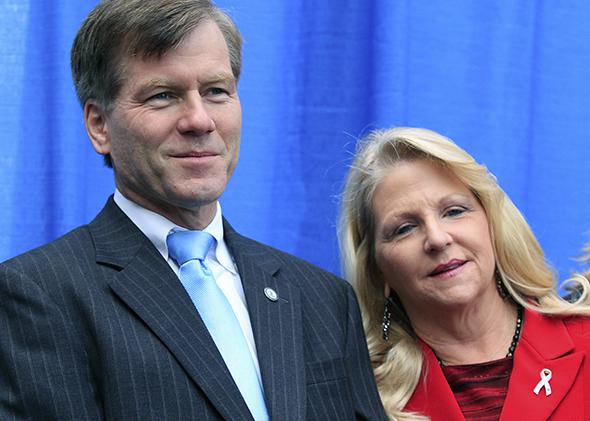Well, it’s official. The New York Times says that Maureen McDonnell, former first lady of Virginia, is to blame. She is, after all, a “former cheerleader.” And as we all know from our casual dabblings in the game of Clue, it’s invariably the former cheerleader, with the candlestick, in the conservatory who is to blame when a statewide corruption scandal is at hand.
This morning’s Times features a piece by Trip Gabriel titled “When a Political Spouse Helps Cause a Downfall” that purports to be about Maureen McDonnell’s assistance in creating the widespread greed and corruption problems for which she and her husband were indicted earlier this week. But of course the piece itself goes on to lay out all the ways in which the avaricious former cheerleader was in fact more Lady Macbeth than co-conspirator, asserting that according to the 43-page federal indictment, she was “the person whose desires for luxury items led the couple to use the governor’s office to promote a contributor’s dietary supplement business.”
Well, maybe. I read the indictment as reflecting pretty equal-opportunity grossness, but the media temptation to allocate disproportionate blame at the aging beauty must be too great. The Times is hardly the only offender by the way. The Blame Maureen meme is spreading: Politico calls her “Lady Macbeth with an AmEx card” and accuses her of leading her husband astray. (Note that in the Times photo, the former governor is a broken man while his wife glares at him and mentally shops for spot removers to get all the damn blood off the de la Renta.)
The implication that it was the former NFL cheerleader and her quest for designer shoes and gowns that brought the McDonnells down is kind of a journalistic chip shot. Cue the citations to Calista Gingrich and Sarah Palin and all the countless silly women who shop their families into political ruin. If you reside chiefly in reality TV land, such accusations fit the stereotypes perfectly. But the truth is that McDonnell was just as profligate and greedy as his wife, and the indictment proves it. So why is his own fondness for racking up exorbitant golf expenses relegated to the last disembodied paragraph of the Times piece? Is it because in the hierarchy of political greed, golfing, and private jets rank as legitimate expenses whereas couture dresses and shoes are foolish? Remember: When men are extravagant it’s manly. When women do it, it’s tacky.
To be sure, it was Maureen McDonnell who made the initial contacts with Jonnie Williams and it was she who took the early lead in asking him for financial help. But the implication that she somehow benefitted more than her husband, or that her trashy, pom-pom ways singlehandedly led the family to their financial distress is too easy to resist. Even the articles declaring that Maureen in fact “isn’t a Lady Macbeth” or that her husband was equally culpable, are devoted to gleeful rubbernecking at her shopping sprees.
There are a lot of reasons Mrs. McDonnell appears to be the prime mover in Graftgate. For one, she clearly fell prey to the well-documented double standard that holds that first ladies need to wear designer gowns while male public officials can squeak by on a fabulous tie. Maureen gets the lion’s share of the headlines because she wanted clothes—actually, because she thought she needed them. And it was, after all, her frantic email we all quoted: “I need to talk to you about Inaugural clothing budget. I need answers and Bob is screaming about the thousands I’m charging up in credit card debt. We are broke, have an unconscionable amount in credit card debt already, and this Inaugural is killing us!! I need answers and I need help, and I need to get this done.” But let’s recall that the McDonnells’ avarice sorted itself perfectly along traditional gubernatorial gender lines: He took the tickets to sporting events, she took the catering money. To suggest that her excesses are more suspect or tawdry says more about our values than hers.
The truth behind the McDonnell’s financial troubles is more complicated and a lot less gender-freighted than the headlines suggest. As Matt Berman explains, like a lot of non-Shakespearian Americans, the McDonnells got whacked when the housing bubble burst, and they were already in serious financial trouble when he assumed office. With respect to the loan money they accepted, Berman notes: “That money wasn’t just for dresses or Rolexes. Maureen McDonnell received the $50,000 and deposited it into her personal bank account, which before that infusion had a balance of only $4,798. Nearly $20,000 of Williams’ money was used not for makeovers, but to pay off credit-card debt. ‘Thanks so much for all your help with my family,’ Bob McDonnell wrote Williams later that month.”
Both McDonnells used donor money and gifts to live large on his $175,000-a-year salary. But the way Virginia’s ethics laws work, disclosure is not required for gifts to spouses and family. That means that gifts to spouses are OK and gifts to the governor are problematic. So blaming the spouse for accepting gifts under such a regime makes no sense. Maureen wasn’t Lady Macbeth. She might have just been a loophole.
The fact that each member of the marriage has separate counsel tells me they may eventually try to lay the blame on one another. In his early filings Bob McDonnell charged that the “first lady did not inform the governor” of various actions. And they are charged with different misconduct. But the McDonnells made the sorts of choices every married couple makes: To spend and to garner debt (and then also made choices not every married couple makes: to take lavish gifts and to lie about it). Let’s leave the cheap accusation that it’s always the greedy little lady’s fault when a couple finds itself in debt where it belongs: In the bad novels of the 19th century.
